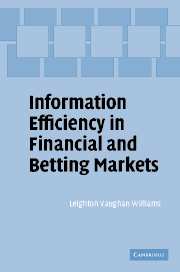Book contents
- Frontmatter
- Contents
- List of figures
- List of tables
- List of contributors
- Introduction
- Part I The concept of information efficiency
- Part II Selected readings
- 4 An assessment of quasi-arbitrage opportunities in two fixed-odds horse-race betting markets
- 5 The presence of favourites and biases in bookmakers' odds
- 6 Searching for semi-strong form inefficiency in the UK racetrack betting market
- 7 Models, markets, polls and pundits: a case study of information efficiency
- 8 Longshot bias: insights from the betting market on men's professional tennis
- 9 Biases and insider trading in exotic bets on thoroughbreds
- 10 On the improbability of information efficient parimutuel betting markets in the presence of heterogeneous beliefs
- 11 Modelling gambling demand in a laboratory casino: discovering the importance of individual-specific effects
- 12 Market efficiency of the 50–30–20–10 horse-racing spread betting market
- 13 Insider trading and bias in a market for state-contingent claims
- 14 Rationality and efficiency in lotto games
- 15 Efficiency of the odds on English professional football matches
- 16 Modelling distance preference in flat racing via average velocity
- 17 Testing for market efficiency in gambling markets: some observations and new statistical tests based on a bootstrap method
- 18 Information (in)efficiency in prediction markets
- Index
- References
15 - Efficiency of the odds on English professional football matches
Published online by Cambridge University Press: 09 July 2009
- Frontmatter
- Contents
- List of figures
- List of tables
- List of contributors
- Introduction
- Part I The concept of information efficiency
- Part II Selected readings
- 4 An assessment of quasi-arbitrage opportunities in two fixed-odds horse-race betting markets
- 5 The presence of favourites and biases in bookmakers' odds
- 6 Searching for semi-strong form inefficiency in the UK racetrack betting market
- 7 Models, markets, polls and pundits: a case study of information efficiency
- 8 Longshot bias: insights from the betting market on men's professional tennis
- 9 Biases and insider trading in exotic bets on thoroughbreds
- 10 On the improbability of information efficient parimutuel betting markets in the presence of heterogeneous beliefs
- 11 Modelling gambling demand in a laboratory casino: discovering the importance of individual-specific effects
- 12 Market efficiency of the 50–30–20–10 horse-racing spread betting market
- 13 Insider trading and bias in a market for state-contingent claims
- 14 Rationality and efficiency in lotto games
- 15 Efficiency of the odds on English professional football matches
- 16 Modelling distance preference in flat racing via average velocity
- 17 Testing for market efficiency in gambling markets: some observations and new statistical tests based on a bootstrap method
- 18 Information (in)efficiency in prediction markets
- Index
- References
Summary
Motivation
This chapter considers two dimensions of efficiency that we suspect may be related. In the context of results betting on English professional football (soccer), we test for the presence of longshot bias and for the influence of ‘sentiment’ on the odds offered by bookmakers.
Positive longshot bias (such that superior returns accrue to bets on short-odds outcomes) is a well-documented feature of many horse-race betting markets. However, Woodland and Woodland (1994, 2001, 2003) present evidence of reverse or negative bias in the odds for two American team sports, (ice) hockey and baseball. It is potentially interesting to investigate whether their finding that it is financially more rewarding to bet on underdogs generalises to team sports in other countries. If it does, analysing differences in the betting markets between horse-racing and team sports is likely to be instructive since any convincing theory on the source of longshot bias needs to be able to account for cases of both positive and negative bias (Vaughan Williams and Paton, 1998).
One of the more obvious points of difference between horse-racing and team sports is that enthusiasts for the latter tend to pledge their allegiance to a particular club and have a long-term interest in and commitment to the success of ‘their’ team. This phenomenon of ‘the fan’ may then have a real impact in the betting market. Clubs attract thousands or even millions of supporters and profit from their loyalty by selling them high-priced souvenirs such as replica shirts.
- Type
- Chapter
- Information
- Information Efficiency in Financial and Betting Markets , pp. 330 - 338Publisher: Cambridge University PressPrint publication year: 2005
References
- 6
- Cited by



